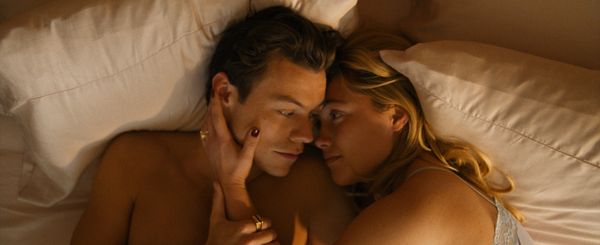Eye For Film >> Movies >> Darling (2015) Film Review
Darling
Reviewed by: Jennie Kermode

Madame (Sean Young) is worried about leaving the young woman whom she calls Darling (Lauren Ashley Carter) alone in the house. It's an absurd worry, as she hired her to be there, to take care of the place, and warning her about how that last person to do that job jumped from a balcony is clearly something she relishes. There's just one more instruction. That little door at the end of the corridor - it should always be kept locked. She is not to concern herself with what's on the other side.
Alone in the house, Darling organises her things. In a drawer she finds an inverted crucifix on a silver chain. Just a trinket or a hint of something sinister? When she accidentally drops it in the street, a friendly stranger (Brian Morvant) returns it to her. Something about him sets of a chain of hallucinations or flashbacks. After an initially terrified reaction, she begins to stalk him. This won't end well.

Traditionally the lonely woman broken down by the world kills herself rather than turning her fury outwards, and the film hints at something a bit more complicated with its suggestion that Darling has kept secrets about her past; but nevertheless, we have seen characters like her before, and in films whose quality makes them dangerous to compete with. The most obvious parallel is with Polanski;s Repulsion. Catherine Deneuve's troubled Carole, however, gets more time to develop, letting us grow closer to her before we are immersed in her breakdown. Darling is fiercely melodramatic from the start. A wild, discordant soundtrack, reminiscent of Keegan DeWitt's work in Queen Of Earth, plunges us into paranoia the moment Madame has left the house, screeching alarm as Darling explores seemingly mundane rooms. It's a style that could easily descend into chaos or comedy, yet somehow director Keating keeps his balance, and lingering shots of walls and windows, beds and chests of drawers are imbued with terror.
Much more style than substance, Darling is light on plot but doesn't shy away from brutality, alternating frenzy and grim follow-up in a manner reminiscent of early black and white giallo. Most of its impressive moves are borrowed from somewhere but they're well delivered. Keating has a confidence that belies his youth. He's aided by a riveting performance from Carter (known to horror fans for her very different work alongside Pollyanna McIntosh in The Woman), who is alert to the possibilities offer by the role and gives it her all. Like Polanski before him, Keating gives us lots of close-ups of his heroine's face. There's also a flavour of Mulholland Drive in a film that's never entirely clear about what is dream and what reality, with personal identity also called into question.
Derivative as it is, Darling will only go so far with educated viewers, but its intensity and panache mean it's likely to do big things for Keating and Carter's careers. If they take off the way they deserve to, you'll be pleased if you can say that you saw this at the start.
Reviewed on: 28 Mar 2016
















